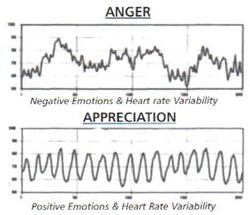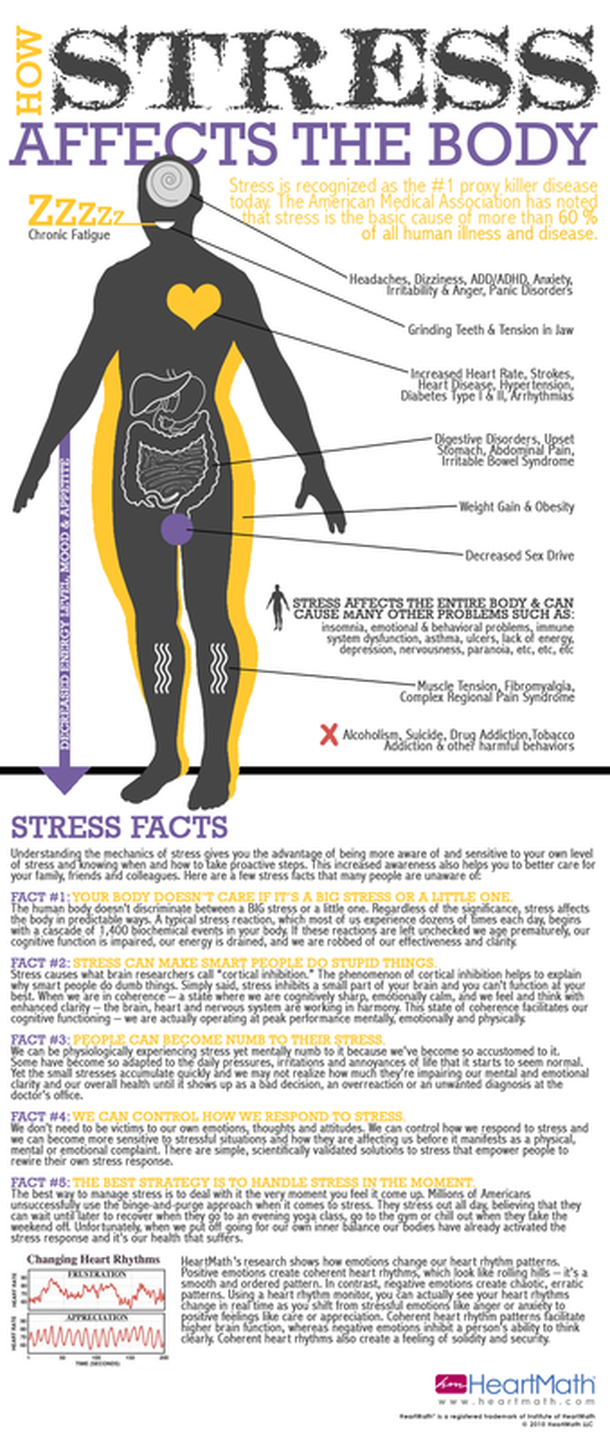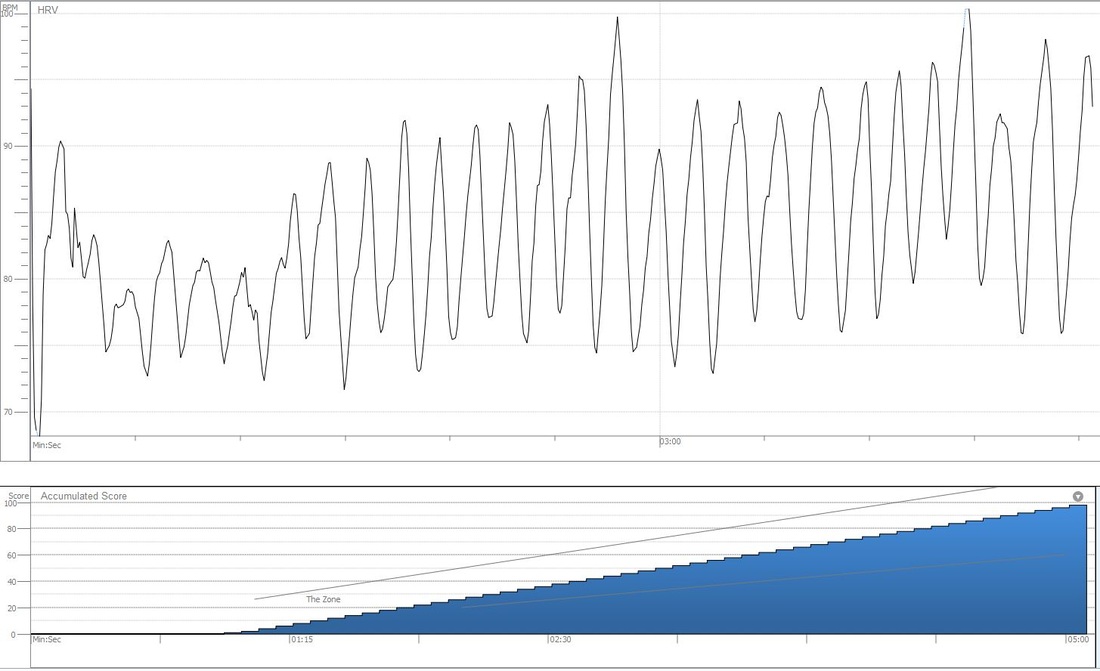|
Know what I love about HeartMath? Everything. Ok, so that's not very helpful. Let me explain. HeartMath really addresses the root of my patients' stress-related issues. I feel that this particular type of biofeedback, which uses guided intervention in heart rate variability patterning, gets to the bottom of issues which are so prevalent in our society (feeling stressed out, exhausted, nervous wrecks, overwhelmed, constant fatigue, the list goes on and on). So here's the whirl-wind intro, though you're always welcome to call for a complimentary 15 minute introductory consult... you can meet me and talk further about how I can help you achieve a better state of health. First, why would someone use HeartMath? Well, one of the most common reasons is a stress-related condition, such as anxiety, depression, insomnia, hypertension, attention disorders and chronic pain. Take a look at the many ways stress ruins your body and mind If the image above is a little blurry, here's the original
Bad, huh? Yes, in general, stress is bad. A little is ok, but most of us have waaaay more than a little stress in our lives. So how does HeartMath work? What is it doing? It's harnessing your innate heart-brain connection, and using that internal power for good (relaxation and restoration) instead of evil (panic attacks and out of control emotions). Trippy, huh? It is optimizing the communication between your nervous, cognitive hormone and immune systems to balance out any mis-signaling. Through this process you will learn to identify and remove all internal signals that, perhaps subconsciously, are working against you instead of for you. The end result? Common effects are increased happiness, more positive outlook on life, little or no stress reaction from what was before stress-inducing issues (work, relationships, finances), a full release from prior feelings of overwhelm and burnout and the ability to finally overcome a physical or hormonal issue (like those listed in the graphic above) just to name a few. This technique is simple, powerful, and transformative. Everyone should give it a try. How does this whole process work? You can learn from the decades of research and look up conditions and information important to you on the HeartMath website. They offer biofeedback devices to anyone, though working with a healthcare professional such as myself ensures proper monitoring, assistance and its optimal placement within a comprehensive wellness approach. I use HeartMath biofeedback during office visits and program check-ins for those who could benefit from its use as well as offer shorter stand-alone sessions. To best learn and implement the biofeedback techniques in your everyday life above and beyond the few times I guide you through the process. Most patients benefit from an initial round of 4-6 sessions which will be part of an all-inclusive integrative plan where all your healthcare issues are addressed and attended to. My current weight loss and stress reduction program, 'slim down & happy up,' includes HeartMath sessions during as many of the bi-monthly check-ins as you'd like. That means up to 6 HeartMath sessions are automatically included in the program, no extra cost at all! The next 'slim down & happy up' program will run 3 months, starting September 9th. Registration begins on our next session Monday, August 19th, check out the full details here. To your good health,
0 Comments
 Scanning my bio page, and you can sum up my education and experience within a few seconds. What you won't know is "Why?" Why do I do what I do? And ... what right do I have to tell you and everyone you know that stress isn't a given. I might not even know you, your aggravating boss, your mother who never leaves you alone, your kids who drive you up the wall with worry. None of it. I may not know anything that's going on in your life. So, just why do I think I am? Maybe it's because I'm the eldest child in my family. The stereotypical bossy older child. Don't ask my younger siblings- it's all lies. I'm motherly and nurturing not bossy. Or a matter of perspective, whatever. So, I get to tell you how to be healthy because I'm a doctor. I get to tell you how to do it from a really common sense, healthy approach which is supportive to your body, mind because I'm a Naturopathic Doctor. But why do I think you can ditch your stress? Because I've done it. I've crossed over that bridge- or maybe I choose to cross over again and again every day of my life. I used to be a nervous wreck. Really. You know the type. I was stressed out and living on my last nerve on a daily basis. I was a living mascot of those dorky "I have one nerve left, and you're on it" T-shirts, or seen here in chihuahua form. Or maybe it's not a chihuahua, I don't know (the only dog categories in my mind are: big, small, friendly and growling). Part of my stressed out picture comes from the fact that I've always been "busy." From childhood on, busy, busy, busy. You know, the kid who's in everything, and the co-ed who doesn't have a minute of down time. I've always been a big proponent of getting and keeping your priorities straight, so in addition to the work and school schedule, I've also always worked in exercise, family time, volunteer time and other activities. No time for me, no peace and quiet. And what did this big bundle of messy nerves look like? Well, on the outside, not too bad. On the inside, constant tension, stress, anxiety and unrest, a history of heart palpitations and sometimes worse. There's been the occasional panic attack (it's always fun when you feel like you can't breathe) and one week of anorexia. That was a real blast. Too sick to my stomach with anxiety to eat, too hungry to stop thinking about food. I'm no hero. After a week, I tried getting help from my doctor after being too nerve-shocked to eat for far too long. He recommended Ensure. Thanks, but no thanks. After life circumstances became less crazy, my condition improved.  Jaggedy = bad. Smooth = good. Jaggedy = bad. Smooth = good. Fast-forward to the middle of my internship years. One day while working with a patient's history of anxiety and panic attacks, I got some first hand experience with a weird-sounding computer program. HeartMath. I had heard about this "HeartMath" thing the year prior during a Cardiology lecture. The same lecturer was now my attending physician and was training me in how to use it with patients. On my first go-around in class, it sounded like this breathing and self-guided visualization thing that somehow helped with heart disease and anxiety. And, yep, that's pretty much it in a nutshell. I practice what I preach. It didn't take long after learning how to use HeartMath with patients for me to experiment on myself. And the effects I first initially and every day since is what propels me to use it as a key part of my clinical practice. Bonus for me- no more being stressed out all the time, and definitely no panic attacks and upset stomach. Every day that I use the HeartMath system, I can see myself building up my internal reserves. Stressed to relaxed. Upset to calm. Tired to energized. And I can feel the effects whenever I do it, computer monitor or not. In the car, in the shower- there's nothing more portable and easy to use any time than your thoughts and your breath. Here's an actual screen capture of a session I did a few months ago: This is a six minute session. You can see the raggedy-jaggedy-ness on the left (= low coherence). This pattern smooths out and from a minute in until the end there is a much more smooth sine wave-like pattern (= high coherence). That's good. That's what you want. That's what is the actual key to reducing stress. The bottom graph is internal coherence built up over time. More blue equals less stress.
This is just one of many tools I use for myself and others who are stress-prone, but it's a very foundational tool nonetheless. I just wouldn't have the impact that I do in helping all us stress cases to relax and unwind. It creates real, appreciable change to permanently alter our stress response. I love the many uses of HeartMath. For some I use it to curb a stressaholic's tendency to freak out. For others it's an immediate way in the office to snap someone out of acute anxiety- this will even work during a full-blown panic attack. How great is that? If you know someone who's a stressed out mess, send them my way. I am a guide with a tried and true map which will help them leave the Land of the Last Nerve and arrive at Chill City. Won't you join me? That's who I am. I am here, happy and eager to help. If you want to be Happy, Healthy and Wise, let me help you with two of these three (wisdom not included).  In an ever-developing expansion of my reach on the internet, PDX Holistic has featured Stress: what is it good for? At PDX Holistic, you can find my directory listing, find other holistic practitioners in Portland and get up-to-date articles and information straight from alternative medicine practitioners such as myself. Ninety percent (90%!) of cancers have preventable causes. Here's a quick "What are my chances of getting cancer" quiz. Count up your points for these health factors. Do you: Exercise? Yes= 0 Sometimes=1 Never=2 Smoke? No=0 Used to=1 Yes=2 Drink alcohol? No=0 More than 2 a day=2 Get checked for STIs? Yes I have=0 No or "What is that?" =1 Eat fast food? No=0 Occasionally=1 Daily=2 Have exposure to any of these known carcinogens (means cancer-causers). One point for each: radiation exposure (occupational or many, many X-rays), polluted water, chemical or industrial toxin exposure (such as from your occupation or living nearby a chemical plant) and a history of bad (blistering) sunburns. Now, if you didn't notice the pattern above, this is not the SATs. More points is not better- it's worse off for your cancer risk. And since 95-98% of all cancers are not genetic (inherited and perhaps inevitable), then that means there's ample time and resources for cancer prevention. Take a look at this engaging infographic from Rock Your Cause and see your nearest preventive medicine doc and cultivate your health for now and decades to come. Contact me for more, or feel free to email me day or night at [email protected]. Be healthy, well and happy. And remember, "prevention is the best cure."
So how nutritious is your food? How much calcium, vitamins and iron do you really get out of your food? And how's a person supposed to know? Well, if you look to the CDC's recent release of their seven-year long project, the National Health and Nutrition Examination Survey, then there's not much to worry about. On average, only 1 to 10% of those tested were nutritionally deficient in any given vitamin or mineral. But how can you know? How do you know if you get enough folate or omega-3 fatty acids? And how much does your food contain, anyways? Do we need vitamin and mineral supplements? To summarize my answer to these and many more questions, please take a few minutes and view this highly informative, engaging and inspirational video by Dr. Terry Walhs MD. Since whole organic fruits and vegetables are where it's at, recently I was inspired to create a lunch that Dr. Walhs would approve of. Seen below, it's a garden salad and sauteed vegetables, complete with many colors and sulfur-containing foods. So if you don't get enough nutrients from your food alone, how can you tell? In developing countries and areas where access to food is limited, the types of malnutrition seen there (e.g. poor development, brittle hair and teeth) is much more severe than the insidious type seen in America: overweight and overfed but nutritionally poor diet. I would call this nutritional insufficiency. What can that look like? Some one lacking in one or more of our basic vitamins and minerals may experience headaches, poor concentration, low stamina, poor wound healing, many different skin complaints, tension, nervousness, depression and/or low energy. Might you know any one with one or more of these complaints?
Let me know any specifics I can answer on the above raised topics or feel free to write below any responses this topic raises. I am eager to answer readers' questions, but as always, the material here is no substitute for careful and conscientious medical advice. Naturopathic physicians are experts at dietary analysis and can identify unique nutritional deficiencies or insufficiencies you may have. This is after taking into consideration any one of a number of common complaints which are seen as "normal" but may in fact be easily treated with a few simple dietary changes. Please check in with your local ND for concerns specific to your situation. Most people have more inflammation (what we may call "pro-inflammation reactions") happening than their body really needs. Too much inflammation increases the severity of all those diseases and medical conditions we discussed in Part 1 (few diseases are really free from inflammation's influence), as well as leading some seemingly minor health complaint (such as occasional achy joints or a mild skin rash) into more severe disease categories all together (developing Rheumatoid Arthritis or Ezcema).
High levels of inflammation also lead to other diseases or conditions hopping on for the ride and serve to worsen your overall health (high blood pressure, then coronary artery disease then heart attack). To combat this, one must identify what actions and circumstances lead to more vs. less inflammation. Inflammatory causes are a lot farther reaching than simple traumas. Most of your body's inflammation actually comes from all those factors in your day to day life that stress you out and make you less healthy overall. These include dietary and exercise choices, as well as pretty much any thing you surround yourself with that exhausts you and makes you irritable and on edge (work? relationships? daily commute?). And anti-inflammatory helpers include a much larger list than just that Aspirin or Aleve in your medicine cabinet. Every choice you make to lessen stress and strengthen your health are working on your side to decrease inflammation in your body. Calm, nutritious, leisurely dinner with loved ones? Put that in the anti-inflammatory column. Cramming down a burger and cola while fuming about the rush hour traffic you're trapped in? That is upping the inflammatory responses in your body. So continue to make choices to support your health and lessen your stress. Lastly, feel free to contact me any time to continue this discussion further. I'm also open to topic suggestions, particularly related to health in the news. Send me an article link, or other topics that have come to your attention, and I look into writing a piece about them here. Thanks for reading! Angela Inflammation- you've all heard of it, but few understand what's really going on. It's a lot more than just the swelling that happens after you twist your ankle or slam your finger in the car door. It's a very complex and dynamic interplay of many immunologic compounds interacting with each other in your body- on an almost constant basis.
It all starts with some type of trauma- an injury like listed above, or something a lot more subtle like blood vessels getting stressed out by too much tension (high blood pressure), or areas of the body becoming hypersensitive to invisible particles in the air (allergic reactions like hay fever). What happens then is a directed cascade of immune reactions where some guard molecules alert others to make reaction, and the message keeps getting passed along to more and more immune cells until you start the visible signs of inflammation like swelling or getting itchy eyes. So is it all bad? Not really. There's a certain low amount of inflammation that is helpful when you really do injure yourself, to prevent overuse or strain of the recently injured area. But as for the rest of the inflammatory reactions we experience day in and day out, it's really better to decrease these as much as possible. So how do you know if you have more inflammation than your body needs? Well, there's some well established medical conditions that will always be associated with high levels of inflammation. Some listed above are allergies (hay fever, allergic skin reactions/ ezcema, etc), high blood pressure (or having a strong family history of high blood pressure) and all other forms of Coronary Artery Disease signal high levels of inflammation as well as some other common conditions like asthma, migraines/ tension headaches, rheumatoid arthritis, PMS, problems with proper bowel function such as colitis and Irritable Bowel Syndrome- the list goes on and on. In Part 2, we will talk more about inflammation, what it leads to and what can increase and decrease your body's amounts. Please leave any comments or questions below, or see the Contact section to write me a note. |
Archives
June 2024
Categories
All
|
about the doc |
patient infocontact |
|
Privacy Policy
© Copyright 2011-2024, Dr. Angela Cortal ND LLC website content is for educational purposes only and is no substitute for medical advice (see the Terms of Use Agreement for this site), you must establish a doctor-patient relationship to receive that! |






